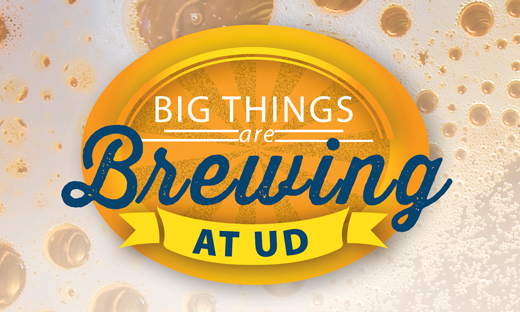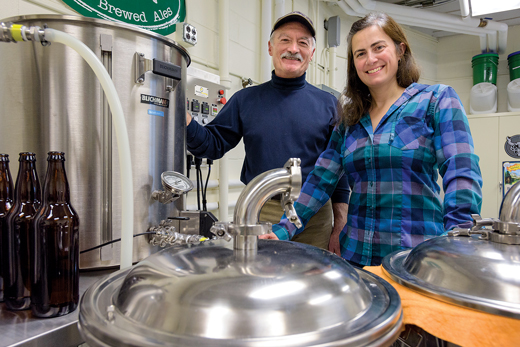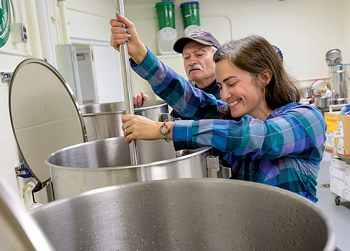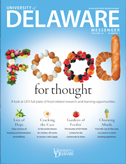
OUR FACULTY | In fermentation, there is joy.
The fizzy, boozy byproducts of binge-eating bacteria are the true artisans of the beer we drink, the yogurt we eat, and in the view of some academics, the very aspects of civilization that have kept humankind from a depressingly primitive destiny.
Thanks to fermentation, early humans were able to delay food’s decay, boost its digestibility, and, on occasion, indulge communally in the stress-relieving pleasures of mild intoxication (a tribal ritual whose closest modern descendant might be the “cocktail party”). Predictably, it was only a matter of time before the smile-inducing, society-building, palate-enticing emissions of single-cell organisms also commanded rapt attention from the world of science, the boardrooms of business and the halls of academia.
At UD, the science of fermentation has been a popular topic for years in some classes, but today it’s on the verge of bubbling into a full-fledged revolution, opening doors to new careers for hundreds of UD students, and positioning the University as a hub for fermentation studies.

In the College of Agriculture and Natural Resources, $1.15 million in donations has helped support a new 3,000-square-foot, state-of-the-art food processing facility now taking shape at Worrilow Hall, where students can research the microscopic magic of fermenting beer, wine, hard cider, cheese and yogurt. In local restaurants, UD interns are already studying the art and science of beer brewing. And in time, it’s not too far-fetched to imagine Blue Hen-labeled beer and wine becoming available for purchase, supplementing UD’s current campus-made lineup of ice cream, honey, wool, produce and beef.

The foundations of those ambitions are already being laid. Down in the basement of an obscure UD farm building, Profs. Nicole Donofrio and Dallas Hoover have installed a 15-gallon mini-brewery to give students hands-on experience in their Fermentation Science class. And through Prof. Pam Green’s Science of Wine class, connections have already been made with local vintners who can share crucial knowledge.
Once the Worrilow facility is open (possibly by early 2018), College of Agriculture and Natural Resources Dean Mark Rieger hopes prospective Food Science students will have even more incentive to choose UD. Now, those students will be able to take part in a planned partnership with local Iron Hill Brewery that will give them a chance to study under its brewmaster and restaurant managers. In return, UD will supply Iron Hill with three custom flavors of UDairy Creamery ice cream to be served at all 12 of its regional locations.
A more vibrant fermentation program will also benefit students who choose the planned minor in Beverage Management, offered jointly by CANR and the Lerner College’s Department of Hospitality Business Management, Rieger says. That program got an additional boost earlier this year, when Martin Micklin, BE76, and wife Terri donated funds to strengthen the craft brewing component. And the Worrilow expansion is allowing the popular UDairy Creamery to greatly expand its production capabilities, while providing modern workspace for other non-fermented UD products like honey.
Delaware’s thriving craft brewing industry could help synergize UD efforts—and provide pipelines to industry jobs for students. “With Dogfish Head, Iron Hill, 16 Mile Brewery and others nearby, we’re kind of ground zero for craft brewers that have become very successful,” Rieger says. “Hopefully we can get some industry partnerships. It is a huge, booming industry.”
In Delaware, that industry accounted for 2,689 brewing, distributing and retail jobs in 2014. Brewing operations alone made a $48.8 million contribution to the economy, according to the Beer Institute.
Those brewers would love to source ingredients for their beer locally, and UD would like to be that source, hoping to raise $25,000 to plant a field of hops—some of which will be used by the popular Delaware pub Two Stones for a beer that will proudly proclaim its UD connections.
Other beer-centric crops could be on the way.
“We’re not growing any barley yet,” Donofrio says.
“Not yet,” adds Hoover. “Maybe someday.”
UD’s fermentation science efforts also seem certain to inspire beneficial partnerships between colleges. Rieger envisions art students designing beer labels, or engineers helping with machinery, for example. “There’s a lot of science in making this, and it takes a lot of departments coming together.”
In fact, the whole field of fermentation dovetails nicely into several University-wide priorities. “It has aspects of entrepreneurship, and it gives students a very solid hands-on experience,” Donofrio says. “It opens up another job market for them, and it’s a very good one.”
As it digs more deeply into the world of food production, UD will remain careful not to interfere in a broader market. “We want to be able to recover the costs of running these things,” Rieger says. “But we don’t want to go beyond that. We’re not competing against local beer or ice cream businesses.”
Minors in fermentation and brewing are being considered as part of longer-term strategies, says Rieger, who also foresees continuing education classes where the public can discover their own fermentation passions.
“Where would we be without fermentation?” he adds. “It’s the world’s first biotechnology.”
Article by Eric Ruth, AS93



